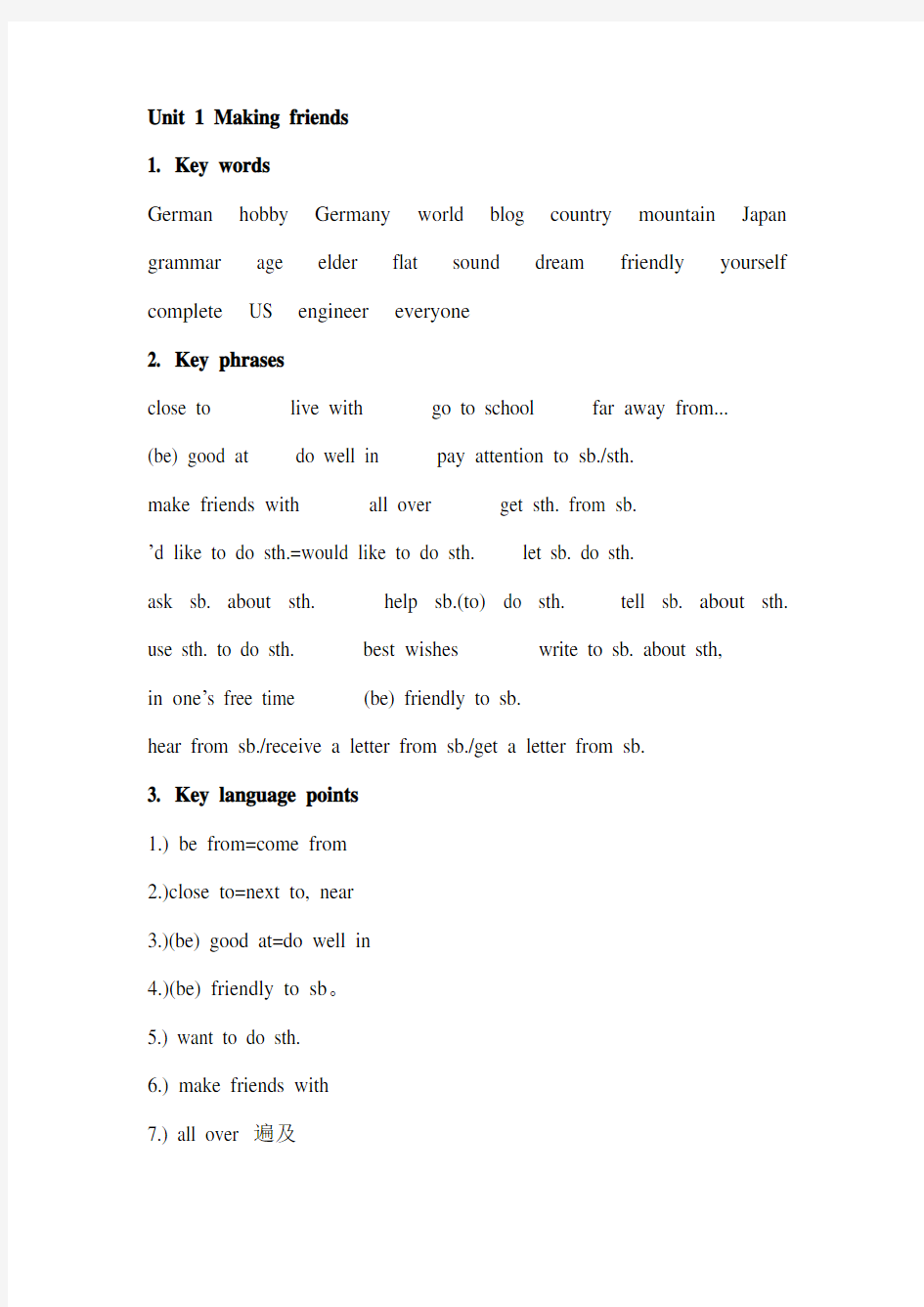
(完整版)深圳牛津版英语七年级上重点词汇语法
- 格式:doc
- 大小:183.06 KB
- 文档页数:24


Unit 1 Making friends
1. Key words
German hobby Germany world blog country mountain Japan grammar age elder flat sound dream friendly yourself complete US engineer everyone
2. Key phrases
close to live with go to school far away from... (be) good at do well in pay attention to sb./sth.
make friends with all over get sth. from sb.
’d like to do sth.=would like to do sth. let sb. do sth.
ask sb. about sth. help sb.(to) do sth. tell sb. about sth. use sth. to do sth. best wishes write to sb. about sth,
in one’s free time (be) friendly to sb.
hear from sb./receive a letter from sb./get a letter from sb.
3. Key language points
1.) be from=come from
2.)close to=next to, near
3.)(be) good at=do well in
4.)(be) friendly to sb。
5.) want to do sth.
6.) make friends with
7.) all over 遍及
8.)’d like to do sth=would like to do sth.
would like sth. would like sb. to do sth.
4.Key grammar
A.特殊疑问句
1.疑问词
what where who how how old when why which whose what time(问时刻) how long how far how soon 多快how often how many how much
2.特殊疑问句构成:特殊疑问词+一般疑问句
B.不定冠词a/an
Unit 2 Daily life
1.Key words
daily bell article ring never end table tennis band ride practice usually together so market seldom guitar Geography grade break start
2.Key phrases
junior high school on foot take part in have a good time go to bed get up talk about between A and B (be) late for school brush one’s teeth ride a bicycle make notes add sth. to sth. at the end of take turns to do sth. arrive at/in
help sb. with sth. Keep a diary remember to do sth. enjoy/love doing sth.
3.Key language points
1.) enjoy(doing) sth.
2.) love doing sth.
3.) ride (rode ridden)
4.) end v. /n.
5.) practice n. practise v. practise doing sth.
6.) (be) late for
7.) on foot
8.) go to bed去睡觉go to sleep睡着了
4. Key grammar
A.一般现在时
1. 当谓语动词为实义动词时:肯定句、否定句、疑问句、回答
2. 当谓语动词为be动词时:肯定句、否定句、疑问句、回答
B. 频度副词和副词短语的使用
1、频度副词使用时一般放在动词前
always usually often sometimes seldom never
2、频度副词短语使用时一般放在句末
every day once a week twice a week all the time
five times a year at the weekend every day/night/year/month... 一、一般现在时:
【No. 1】一般现在时的功能
1.表示事物或人物的特征、状态。如:The sky is blue.天空是蓝色的。
2.表示经常性或习惯性的动作。如:I get up at six every day.我每天六点起床。
3.表示客观现实。如:The earth goes around the sun.地球绕着太阳转。
一般现在时的构成
1. be动词:主语+be(am,is,are)+其它。如:
I am a boy.我是一个男孩。
2.行为动词:主语+行为动词(+其它)。如:
We study English.我们学习英语。
当主语为第三人称单数(he, she,it)时,要在动词后加"-s"或"-es"。如:Mary likes Chinese.玛丽喜欢汉语。
一般现在时的变化
1. be动词的变化。
否定句:主语+ be + not +其它。
如:He is not a worker.他不是工人。
一般疑问句:Be +主语+其它。
如:-Are you a student?
-Yes. I am. / No, I'm not.
特殊疑问句:疑问词+一般疑问句。如:Where is my bike?
2.行为动词的变化。
否定句:主语+ don't( doesn't ) +动词原形(+其它)。如:
I don't like bread.
当主语为第三人称单数时,要用doesn't构成否定句。如:
He doesn't often play.
一般疑问句:Do( Does ) +主语+动词原形+其它。如:
- Do you often play football?
- Yes, I do. / No, I don't.
当主语为第三人称单数时,要用does构成一般疑问句。如:
- Does she go to work by bike?
- Yes, she does. / No, she doesn't.
特殊疑问句:疑问词+一般疑问句。如:How does your father go to work?
动词+s的变化规则
1.一般情况下,直接加-s,如:cook-cooks, milk-milks
2.以s. x. sh. ch. o结尾,加-es,如:guess-guesses, wash-washes, watch-watches, go-goes
3.以“辅音字母+y”结尾,变y为i, 再加-es,如:study-studies
一、写出下列动词的第三人称单数
drink ________ go _______ stay ________ make ________
look _________ have_______ pass_______ carry ____
come________ watch______ plant_______ fly ________
study_______ brush________ do_________ teach_______
二.按照要求改写句子
1. Daniel watches TV every evening.(改为否定句)
___________________________________________________
2. I do my homework every day.(改为一般疑问句,作否定回答)
________________________________________________________